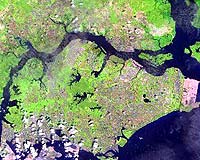 |
Oslo, Norway (SPX) Jun 08, 2009 Members of the Pure Salmon Campaign coalition, a diverse group of stakeholders from key farmed salmon production and consumption nations including Canada, Chile, Scotland, Ireland and the United States, have urged Marine Harvest to eliminate its destructive environmental impacts by separating farmed fish from wild fish populations and finding new sources for fish feed. Marine Harvest is the largest farmed salmon producer in the world and controls more than 20 percent of the market. But, environmental mismanagement and insufficient priority given to biosecurity by Marine Harvest and other aquaculture operators in Chile have had catastrophic effects on salmon industry workers. Widespread outbreaks of fatal Infectious Salmon Anemia in that region have effectively erased Marine Harvest's profits. Overall production of farmed salmon in Chile has declined by more than 50 percent in 2009 alone and more than 20,000 Chilean salmon farm workers have lost their jobs. For the past week, representatives of the global Pure Salmon Campaign coalition have been in Norway meeting with Members of Parliament, salmon farmers, scientists, financial analysts, journalists, river owners and other stakeholders to discuss how Marine Harvest's global salmon farming operations adversely affect the environment. "Since 2005, seven Marine Harvest workers and contractors have died on the job," said Javier Ugarte, president of CONATRASAL, the labor union of Chilean salmon aquaculture workers. "In March 2009, two workers died and Marine Harvest has still failed to make the reasons public. Not only does Marine Harvest fail to pay sufficient attention to protecting the environment and the animals in its care, but the company doesn't even adequately protect its own staff." While disease outbreaks and labor problems pose major obstacles for Marine Harvest in Chile, sea lice continue to plague the company's Canadian operations. Marine Harvest's open net pen salmon farms act as incubators for parasites such as sea lice that can decimate wild salmon populations sharing the same waters. These same open net salmon pens allow thousands of fish at a time to escape easily when there are rough seas and high waves. Other small scale escapes, dubbed "leakage" by the industry, occur daily from poorly maintained pens. "While massive escapes often make headline news, the daily, unreported leakages from open net salmon farms can be equally devastating to the surrounding marine ecosystem," said Alex Munoz, vice president of Oceana Chile. "Aquaculture companies, including Marine Harvest, have done little to address this growing environmental threat. The industry needs to adopt better technology to dramatically reduce the number of escapes before it's too late." John Fredriksen, Marine Harvest's controlling shareholder, has stated that Marine Harvest should relocate open net pen salmon farms from areas that interfere with wild fish. The fish feed issue is yet another problem affecting the farmed salmon industry. It takes significant quantities of wild fish to provide sufficient food for farmed salmon. A 2000 study in the journal Nature calculated that more than three pounds of wild fish (anchovies, herring, sardines, menhaden) are needed to produce one pound of farmed salmon. "Marine Harvest has yet to develop a viable, long-term strategy to manage environmental problems associated with salmon farming," said Don Staniford, European Representative of the Pure Salmon Campaign coalition. "Marine Harvest must commit to concrete reforms to address these problems and reduce their impact on the environment. The company claims to be the model for sustainability in the aquaculture industry, but it has a long way to go before that rings true." Share This Article With Planet Earth
Related Links Pure Salmon Campaign coalition Farming Today - Suppliers and Technology
 Sky's the limit for Singapore gardens
Sky's the limit for Singapore gardensSingapore (AFP) June 5, 2009 When Albert Quek first moved into his home on the top floor of an eight-storey apartment block, he agonised about the limited space he had to pursue his passion for gardening. All he had was a one-square-metre (10.8-square-foot) balcony, barely large enough for his wife to sun the laundry, let alone for him to nurture a garden. Then he had a brainwave. "Why don't I do something verti ... read more |
|
| The content herein, unless otherwise known to be public domain, are Copyright 1995-2009 - SpaceDaily. AFP and UPI Wire Stories are copyright Agence France-Presse and United Press International. ESA Portal Reports are copyright European Space Agency. All NASA sourced material is public domain. Additional copyrights may apply in whole or part to other bona fide parties. Advertising does not imply endorsement,agreement or approval of any opinions, statements or information provided by SpaceDaily on any Web page published or hosted by SpaceDaily. Privacy Statement |